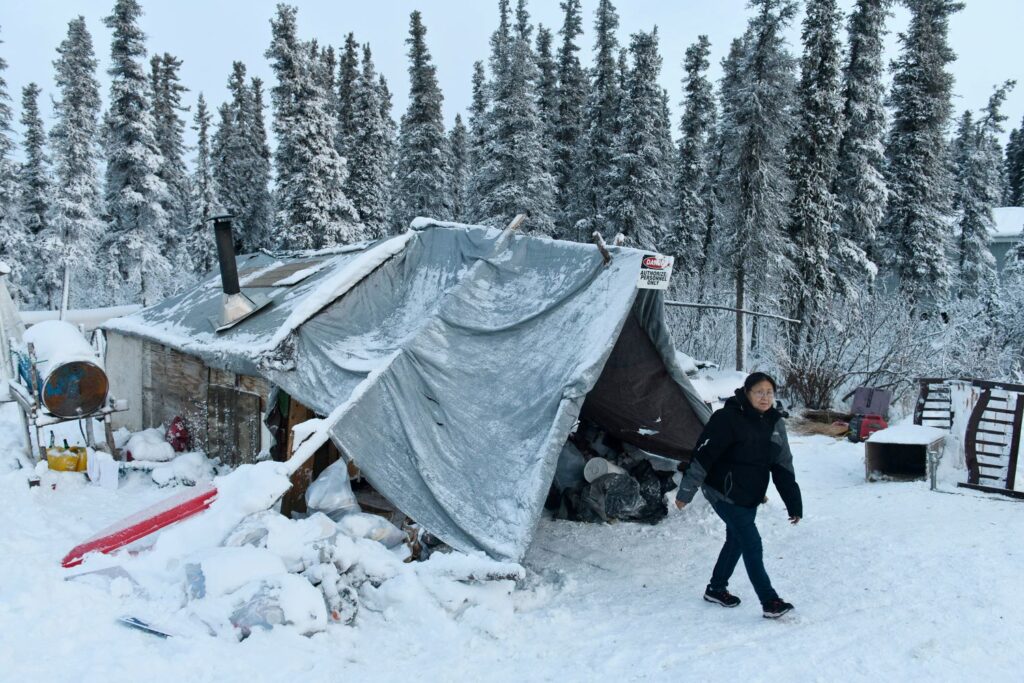Juneau, Alaska (Alaska Beacon) – Advocates say state funding for a housing trust could relieve the burden.
At 10:30 p.m. on a misty Thursday night, dozens of people streamed into the basement of Resurrection Lutheran Church in downtown Juneau for a late dinner and a place to sleep. The temperature hovered around freezing. This is an emergency “warming shelter,” a seasonal, stopgap solution to keep the city’s unhoused population from freezing to death at night.
Pastor Karen Perkins has managed the shelter at the church for two years. She sipped a can of Diet Coke and checked people in at the door. She said the emergency shelter was meant to house about 40 people each night, but they’ve been seeing nearly twice that since January.
“We just started getting more people — and more people who it was their first time being homeless,” Perkins said. “People who had been in a place for a long time, who were not equipped to be on the street. Just extremely vulnerable.”
There’s an estimated 2,000 people experiencing homelessness in Alaska. Most of them aren’t chronically homeless.
By 2:30 a.m., 60 people will have crossed the threshold, eaten and found a place to sleep on a cot or the floor. And when the shelter closed this week, they all had to find someplace else to go.
Emergency shelter is a statewide concern that’s managed on a municipal level. There aren’t dedicated funding sources for these shelters, so Alaska communities must scramble each year to protect their most vulnerable residents. The strain has been acute in Anchorage and Fairbanks. Housing advocates say an infusion of state money could jump-start sorely needed housing development.
Yearly scramble
Brittney Paul and Melody Bierely have been friends for years, and consider each other “street family.” On one of the emergency shelter’s last nights they staked out space on cots and blankets against the wall of the basement, and took turns holding a small dog named Shaggy.
“We all appreciate the dinner that they have here. That’s gonna be missed,” Bierely said. “People want to say that they don’t appreciate this, but they should, for real. And we do. It’s a place for us to be there for each other.”
They, like many people at the shelter that night, planned to head up to the city operated “campground” in the woods above downtown. There’s no recreational camping there — it’s a relief valve for the unhoused people that don’t fit in its permanent homeless shelter or low-income housing. It is also seasonal; it opens as the emergency warming shelter closes.
Bierely said she’s spent summers camping there before, and likes it because she knows people. She and her friends have an informal roll call to check in on their “street family.”
“Just got to make sure everyone’s OK and accounted for, especially lately. Seems like people are dropping like flies,” she said.
Derek Lepoidevin, who said he became homeless after spending time in jail, is headed that way, too, but he hasn’t camped there before. “This is my first year being homeless, this is all kind of new for me,” he said.
Some other patrons said they may end up at the campground also, but it’s a last resort—too crowded and stressful, they said.
The campground is located in the woods above Juneau’s cruise ship dock; the first ship of the season arrived the same day it opened. It has space for about 20 tents on wooden platforms built above Juneau’s damp soil. People who don’t find space there often end up in the surrounding forest near town. In the first week after the shelter closed temperatures are predicted to be in the 20s at night.
People who aren’t prepared to camp or sleep on the street often end up at The Glory Hall, the city’s homeless shelter.
“We were full, now we’re fuller,” said Mariya Lovishuk, the executive director of the Glory Hall. “This happens every year.”
This week she’s working hard to find beds for people around town—so far she’s found shelter for about two dozen people at resources like the Gastineau Human Services Corporation and through the Tlingit-Haida Regional Housing Authority. She’s even bought a few people plane tickets out of town, so they can be housed with family members elsewhere.
“We’re in a bad spot right now, but we’ll work through it,” she said. “We just need more long-term housing.”
Lovischuk said she’s seeing more families who have been evicted this year. She said it’s become really noticeable since the pandemic-era eviction moratorium ended in 2021.
Additionally, a year’s worth of housing assistance is starting to expire for about 900 Alaskans housed by a statewide housing stabilization grant. The program housed about 180 people in Juneau. Lovischuk said about 60% of them have been able to hang on to that housing, but the rest are unhoused again.
Upstream solution
Brian Wilson advocates for better access to housing as the executive director of the Alaska Coalition on Housing and Homelessness. He said if the state had more housing there would be far less need for emergency shelters like the one that just closed in Juneau.
“We haven’t been developing houses at all, most of the houses in the state were developed decades ago and are deteriorating,” he said. “People just are running out of the resources to pay for what’s out there, if that even exists in their community.”
Housing in Alaska is expensive and tough to develop. That’s contributed to very few vacancies in the state, which drives costs up.
Nearly a quarter of adults in Alaska are behind enough on rent or mortgage payments that imminent eviction or foreclosure is a threat, according to current national data. Alaska’s overcrowding rates are double the national average. So Wilson said the state needs to get involved in making housing projects happen.
“We are one of three states without a flexible statewide housing fund,” Wilson said. “It’s a best practice. It’s not reinventing the wheel. It’s not creating something new. It’s a novel concept to Alaska. It’s just what, you know, 94% of the country is already doing.”
A fund technically exists, but there isn’t much money in it yet. It’s called the Housing Alaskans Public Private Partnership, or HAPPP, and it has requested $50 million in this year’s capital budget to get housing projects off the ground statewide.
The newly launched partnership announced its board this week. Preston Simmons is the chair. “Housing is a social determinant of public health,” he said. “It is a fundamental need.”
He said he joined because his years leading Providence Alaska Medical Center showed him the dire need for housing in the state. “We are 2,750 units short in Alaska,” he said. “And there are multiple projects ready to go that just need some funding.”
Simmons said building more housing, even at the middle and high income levels, can help alleviate homelessness, because it reduces pressure on the whole continuum of the housing system.
He said Sen. Forest Dunbar’s office has agreed to sponsor the $50 million request and a resolution that would acknowledge the state’s housing crisis. Simmons said HAPPP asked the Alaska congressional delegation for an additional $50 million.
HAPPP made an identical request of the state last year, but it wasn’t funded. Simmons says this year is different: It has a board and a technical advisory committee and is primed to get started.
Simmons said the state needs more housing across income brackets and the lack of housing is holding back the workforce and the economy. Housing advocates say unhoused people have significantly better chances of reentering the workforce if they have stable housing.
“I fear for them”
On one of the shelter’s last nights, Karen Lawfer, the church council’s president, sipped coffee at one of the dining tables adjacent to the sleeping area. It was about 3:30 a.m., as quiet as the shelter gets.
“A lot of our patrons here — they’re not equipped to camp out. They’re just not,” she whispered over the snores of a man sleeping on a nearby couch. Light from the muted television played across his face. “I fear for them.”
Around 4 a.m. Leora Barrett, one of the shelter’s employees, started making breakfast. It takes a couple of hours to prepare enough food for 60-70 people. She mixed waffle batter and kept an ear out for any disturbances. She said patrons were stressed because they knew they’d have to find a new place to sleep.
“A lot of tears this week,” Barrett said. “I’ve had to console a lot of people.”
At 6:00 a.m., the lights went up and employees played Michael Jackson’s “Thriller” on the speakers. All 60 patrons lined up for breakfast, used the restroom, and dispersed into the wet, gray morning.
Source: Kiny Radio


